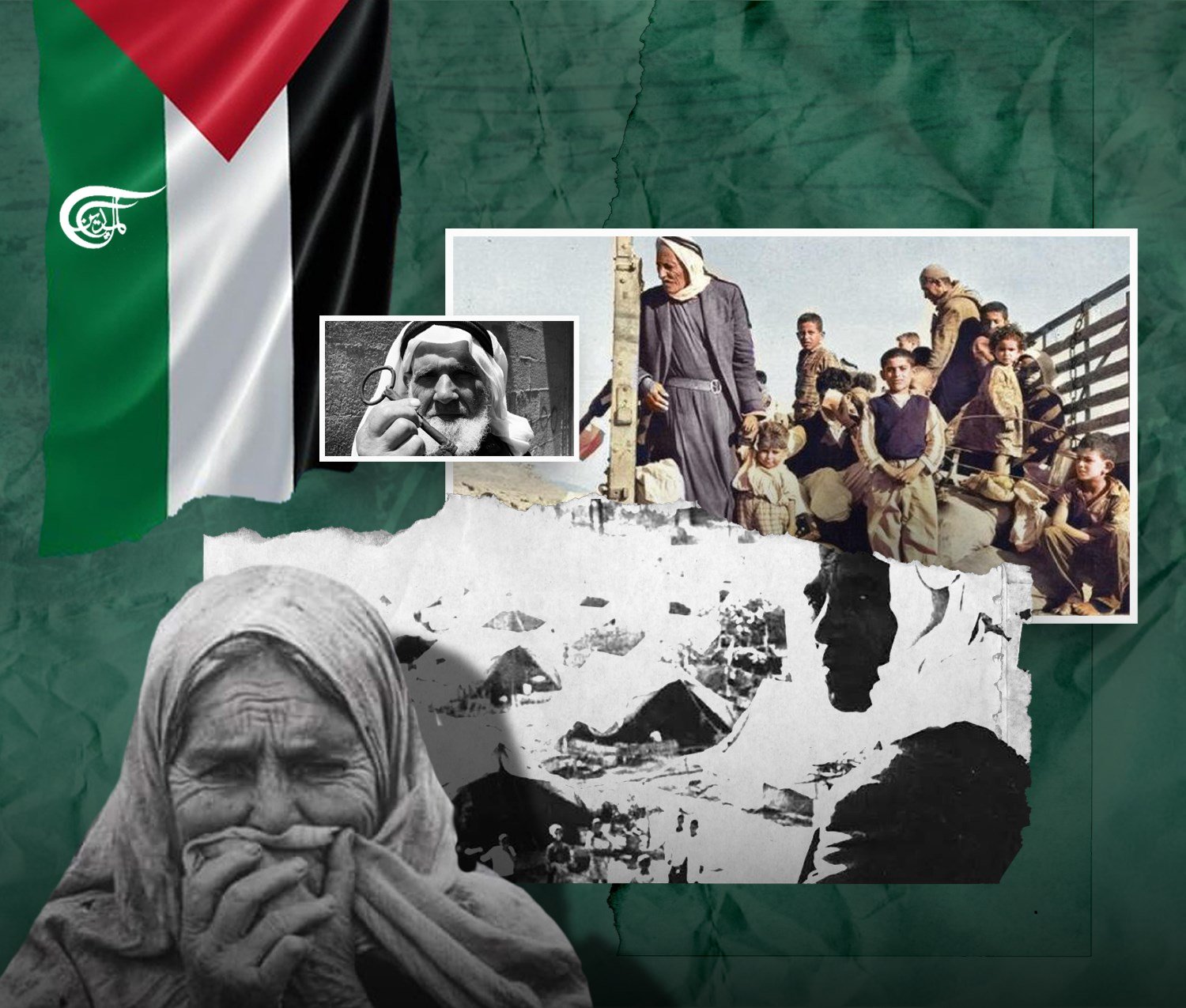Nakba 75: It all started with my little questions!
Though the Nakba happened 75 years ago, it never ended. The Nakba is ongoing in Palestine, and so are new chapters of forced expulsions, which take various forms, just as the occupation is constantly changing its tools.
In May of every year, during the past 75 years, Palestinians in occupied Palestine, in refugee camps, in exile, or wherever they are around the world are commemorating their Nakba, which literally means catastrophe in Arabic. It is the anniversary of the catastrophe that shattered their dreams, killed their hopes, took their homes, ruined their families, destroyed their culture, and seized their lands; a catastrophe that befell them collectively!
It took me many years to understand and realize the scale of the disaster, simply because no one around me talked about it, perhaps to spare me the shock or because it was forbidden. But what I often remember as a kid is one of my parents or both of them saying, "Walls have ears," So, for me, the story of the Nakba/Catastrophe of my people and my family was a sort of missing pieces in a puzzle that I must figure out by myself, and it all started from my little questions when I was a little kid.
Little questions big issues
Once, I was flipping through my parent's wedding photo album, and I saw a few pictures of the same man: brown skin, a mustache, and white hair - almost bald at the front. In all the photos, he was accompanied by a woman whom I thought was his wife. Their frequent appearances caught my eye.
I was curious about this man and his wife; I never saw him visiting us. I asked my father, and he simply answered, "This is Abu Ahmad, my cousin from Lebanon." I was shocked, Lebanon? Why do we have a family in Lebanon? And why have I never heard about this part of my family?
So, this question was only the beginning. I knew that my bigger family lived happily in the village of Al-Birwa, Al-Jalil - north of Palestine, until 1948 when they were forcefully expelled from their homes by the Zionist militias. Later, the village was completely destroyed and a new Israeli “Moshav” was built over the ruins: "Achiahud". The majority of my family escaped to South Lebanon, and they are still there to this day in refugee camps, waiting for their return, but they couldn't because a new entity was forced: “Israel”, and the borders were closed.
For over 45 years, my family had no contact with their family members in Lebanon The brothers didn't know any detail about each other, even if they were dead or alive! In the late 80s, a few of my family members managed to leave the refugee camp and moved to Germany to establish a better life, and I mean human circumstances. Then the first contact happened. It was a sudden phone call to my uncle from his cousin in Germany, where a new generation of my family was born.
I was lucky to stay in my homeland, thanks to my grandmother, Zahra, who was brave and had enough courage to escape to her parent’s village, Al-Bi'ne, where I was born and raised. Moreover, my father was born in Al-Bi'ne, a few years after the Nakba, but he lived under military governance, so he really believed that “walls have ears." This is how I had the privilege to be born, by accident, in "the only democracy of the middle east" and not in a refugee camp, like most of my family.
In the schools of Al-Bi'na, like other schools of any occupied Palestinian town, we were not allowed to learn about our history and roots, about who we are. Many teachers were fired because they dared to speak out, and everything I learned about my identity was "under the table" or behind the "ears of the wall." This is the only way to find your identity in “the only democracy of the middle east."
I remember also when my classmates from renowned families wanted to mock me, or just to make a funny joke, they literally told me, "Be careful. All your family is about two houses and an olive tree," counting the olive tree as it was one of our family members. And the next day, the joke, of course, was another question for my father: Why is our family so small?
The Tango of the Holocaust and the Nakba
I grew up knowing who I am and where I came from, but some pieces of the puzzle were still missing. Since I can't accept the idea that I am not allowed to meet my family, talk to them, or reunite with the rest of the members, I started my own journey one decade ago, because I couldn’t find any answer at the time.
Completely ignoring my grandfather's anger and my family's disappointment that I should become a doctor or a lawyer, I chose to study journalism. One of my final courses was "Testimony and Documenting" with the aim to enable new journalists, professionally and ethically, to conduct interviews with people who survived various tragedies around the world, no matter if it is a war or a natural disaster.
The course (2018) culminated in an intensive 3-day seminar supervised by Dori Laub, a psychiatrist who himself is a Holocaust survivor and founder of the Holocaust Archive at Yale University, USA. The seminar was a preparation for a student delegation of the media and communication studies department to Germany where we, the students, are supposed to conduct interviews with refugees/ asylum seekers who came from Africa and different parts of the middle east, in particular, Syria.
The seminar started with different group simulations to practice the techniques of interviewing, while our professors were giving us advice and criticism under the supervision of Dr. Dori Laub. In my group, I was the one who had to tell the story, and my colleague was the interviewer. I sat on the chair without having any idea what to talk about. I had no tragedy to talk about. This was the second day of the seminar.
I decided to talk about a short conversation that I had the night before with my cousin in Berlin to tell him that I will come soon to meet the family. My cousin was so clear from the first moment when he asked: "Are all the students that you are coming with like you?" I asked him to be clearer, then he replied, "I mean are they Hebrews or Palestinians?" I said that we are a mixed group of Palestinian and Israeli students. The orders were clear and simple, “Zahra, you are one of us and you are more than welcome! But please don't put me in a situation where I have to talk or meet any of them." I could feel his anger.
Now I finished talking, and Dr. Dori started questioning. He asked in heavy Hebrew, "Why last night?" I thought he didn't understand Hebrew, and I said, "The conversation happened last night." Then he asked again: "Why last night?" And I gave him the same answer, "I mean that I talked to my cousin last night." Dori asked the same question for the third time, and at this point, I understood that he was aiming at something else, beyond the concept of time. So I asked him: "Are you currently speaking as a psychoanalyst or as a simulation facilitator?" He said that I should think about what happened yesterday and suggested that I talk to him at night!
He was right. The day before was very difficult, busy, and emotionally heavy. I spent most of the day in the seminar watching horror testimonies of Holocaust survivors, which I found very difficult to imagine. But it was also difficult for me to constantly think: "Why can't I bring my grandfather's testimony, like my colleagues?"
I burst into tears, I couldn't control myself, but a few moments before I left the group to breathe and wash my face, I said, "Wait! Do You think you are enlightened people when you take us to bring testimonies from refugees in Germany? Talk about what happened here! Why going so far? And I left."
When I came back, I found them waiting. Dr. Dori literally said, "It is impossible to talk about the Holocaust without talking about the Nakba, Because the two genocides are bound to each other, keep asking questions." I am one of those who advocate the importance of not comparing the two events, but it is definitely necessary to think about the consequences and intersections and about the very fact that certain testimonies are valid while others are almost illegal, with no validity.
Years have passed since then, and I continue to read, investigate, ask, and interview. I finished my MA degree in European and Modern German Studies while I was pursuing my thesis on Palestinian youth in the sphere of Germany and “Israel”.
This might be a very personal story, but it is just one example out of thousands of stories of Palestinian families who continue to search for their identity and of course their loved ones and relatives.
Though the Nakba happened 75 years ago, it never ended. The Nakba is ongoing in Palestine, and so are new chapters of forced expulsion from Sheikh Jarrah, Masafer Yatta, Khan Al-Ahmar, and Al-Naqab, which take various forms, just as the occupation is constantly changing its tools. As for my little questions, they have become the questions of my children today, and they also take a new form: "Mama, why do we have to go to Karmiel to play? Why are there no parks in our village?"

 Zahra Seed
Zahra Seed
 9 Min Read
9 Min Read








